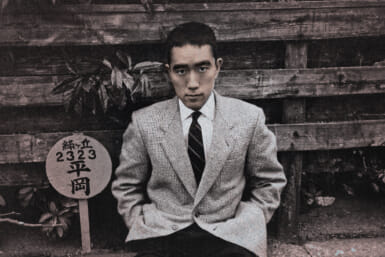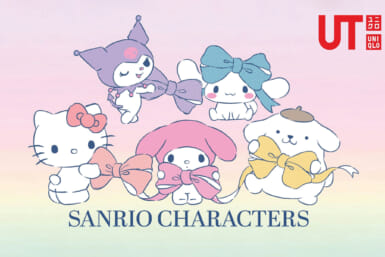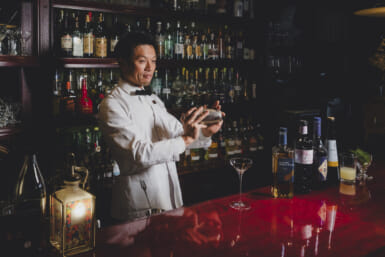by Tanya Korinfsky
Tippling — kampai, skoal, cheers!
Japan must boast the world’s densest number of drinking establishments per square kilometer. Akachochin (small workers’ bars displaying a red lantern outside), karaoke (neighborhood sing-along bars), Western-style pubs and bars, cabarets and hostess clubs—often jammed scores to a block, all are locked in a fierce struggle for existence. Glowing lanterns and blinking neon signs beckon the nocturnal crowds. Black-suited insistent young men thrust cards offering special discounts and deals into the palms of the passersby.
With so many social and occupational activities connected with drink in Japan, the chances are good that eventually you will find yourself in the situation where you are with one or more Japanese set for an evening’s drinking. Even if you are a teetotaler, a lot of the ritual and the form one Is supposed to follow will still apply.
Some of the Japanese habits associated with drinking may not go down too well with foreigners who pride themselves on their own style or who insist on doing it their way. But, if you’re in the minority in a formal social or professional situation, it usually pays to go along with what may seem ridiculous behavior. Your reputation, job, business deal or relationship may suffer if you appear too stiff or unwilling to “understand” your host’s customs.
If you’re to be in Japan for some time, it helps enormously if you can get used to either beer, whiskey, sake or orange soda pop. Because in a lot of places, this will be the entire choice. Disconcerting for the Japanese host is the foreigner who orders some fancy concoction after everyone else has ordered beer. Even if the waiter nods and takes your order, you may be surprised at what turns up! Unless you’re hosting and paying — whereupon you may have a discreet word with the waiter—the best policy is to drink up and shut up! Any protestations or incredulous looks on your part would only embarrass your host and make him lose face.
If you don’t like your drink or don’t drink much, it’s easy to develop the art of putting glass to mouth and giving the appearance of drinking. This may appear a silly game to play or to be taking things too far, but drinking is associated with hospitality in Japan and the rules of behavior between host and guest are particularly strict.
Even as the guest, the foreigner soon notices that he is not generally consulted about venue or any other details. This has all been decided beforehand in accordance with type of occasion, funds at hand and the status of the foreigner. It generally works best to play along in the situation to the best of your ability…If you think hostess bars are immoral, remember, they are part of a long Japanese tradition, and you won’t change that overnight.
As the guest, you will be served first. If it’s sake or beer, raise your container for it to be filled—women hold their left palm under the base and support the container with their right hand. Women, when pouring, support the neck of the bottle with the left hand and grasp the base with the right. For men, neither of these rules apply. Generally, after you have been served, you reciprocate. Both lift glasses, say “kampai” and drink up. This process is repeated back and forth until the host suddenly decides to change the venue or until both parties are drunk. Most foreigners enjoy the ritual associated with sake drinking, but many a foreigner has overestimated his capacity with the stuff.
But, in Japan, there’s no sense of disgrace or loss of dignity connected with becoming drunk. In fact, you’re not considered a good host or guest if you fail to become at least very tipsy. Again, if you don’t like hangovers or you pride yourself on being “sensible,” just fake it. For those who like to drink, it may sound elementary, but a decent meal before the evening’s festivities get under way—taken secretly, of course—will have the Japanese marvelling at your stamina and save you a headache.
Remember, though, toward the end of the evening to “confess” to being somewhat inebriated, even if you aren’t, and the Japanese host will go home happy that he’s done his duty and satisfied that some degree of communication has been established. The meal beforehand is a good idea, too, because most Japanese take their drinking so seriously that they often fail to eat, except for a few tidbits, until the end of the evening. Then they will be found shovelling away oden, yakitori or ochazuke, only to throw it all up several hundred meters down the road. Unlike most other countries, it’s no disgrace to throw up in public in Japan.
Of course, the frequency of this occurrence is no surprise when one observes the furious pace at which Japanese people drink. Another peculiarity of Japanese drinking is the speed with which venues are changed.
Almost in accordance with some secret signal, the group stands up and decamps, often leaving half-full glasses. Try to resist the temptation to argue—most foreigners are just amazed and appalled at this habit — or protest, “But, I haven’t finished my drink yet!” You will be considered a barbarian. Curiously enough, this appellation will also be applied if you leave even one grain of rice sticking to the bowl after a meal.
Who pays for what? If you’re the guest, usually you will not be expected to pay and any offers to buy “the next round” or pay at the next bar are out of place. If, however, you are the host, expect to part with an arm and a leg, for no offers of financial assistance will be forthcoming. You can quite easily become the host without realizing it. If you invite a Japanese friend or acquaintance to go drinking or merely make such a suggestion, you often end up expected to foot the bill.
Another peculiarity of Japanese drinking is the tendency for drinkers to become friendly rather than aggressive or argumentative, as is often the case with their Western counterparts. And singing is considered an inseparable part of any evening that involves drinking, whether performed in the karaoke bar or in the street. Few foreigners would dare sing in public unless they consider themselves professionals. But, as the guest, you will be expected to sing some time during the evening. Those who refuse are thought of as odd by the Japanese. No one is bothered whether you are in tune or not, or whether you are singing the right words (if you forget, just make them up)—what matters is that you participate.
To sum up—be served, serve and sing, and the chances are you’ll come to a closer understanding of the spirit of Japan. Here’s luck!








